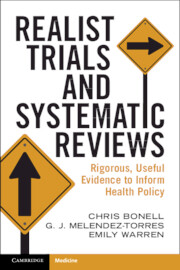Book contents
- Realist Trials and Systematic Reviews
- Reviews
- Realist Trials and Systematic Reviews
- Copyright page
- Contents
- Figures
- Tables
- Boxes
- Acknowledgements
- Chapter 1 Introduction
- Chapter 2 Why Are Trials and Systematic Reviews Necessary but Currently Insufficient to Inform Health Policy?
- Chapter 3 Realist Critiques and Manifesto for Evaluation and Reviews
- Chapter 4 Building Realist Theory in Evaluations
- Chapter 5 Refining Realist Theory through Process Evaluations
- Chapter 6 Testing Realist Theory through Trials or Other Evaluation Designs
- Chapter 7 Building and Refining Realist Theory in Systematic Reviews
- Chapter 8 Testing Realist Theory through Synthesising Outcome Evaluations
- Chapter 9 Using Evidence to Inform Intervention Scale-Up and Transfer
- Chapter 10 Using Evidence to Refine Middle Range Theory
- Conclusion
- References
- Index
Chapter 5 - Refining Realist Theory through Process Evaluations
Published online by Cambridge University Press: 08 February 2024
- Realist Trials and Systematic Reviews
- Reviews
- Realist Trials and Systematic Reviews
- Copyright page
- Contents
- Figures
- Tables
- Boxes
- Acknowledgements
- Chapter 1 Introduction
- Chapter 2 Why Are Trials and Systematic Reviews Necessary but Currently Insufficient to Inform Health Policy?
- Chapter 3 Realist Critiques and Manifesto for Evaluation and Reviews
- Chapter 4 Building Realist Theory in Evaluations
- Chapter 5 Refining Realist Theory through Process Evaluations
- Chapter 6 Testing Realist Theory through Trials or Other Evaluation Designs
- Chapter 7 Building and Refining Realist Theory in Systematic Reviews
- Chapter 8 Testing Realist Theory through Synthesising Outcome Evaluations
- Chapter 9 Using Evidence to Inform Intervention Scale-Up and Transfer
- Chapter 10 Using Evidence to Refine Middle Range Theory
- Conclusion
- References
- Index
Summary
It is important to limit statistical testing of context–mechanism–outcome configurations (CMOCs) to those which are most plausible. This is because testing too many hypotheses will lead to some false positive conclusions. Qualitative research conducted within process evaluations is a useful way to inform refinement of CMOCs before they are tested using quantitative data. Process evaluations aim to examine intervention implementation and the mechanisms that arise from this. They involve a mixture of quantitative (for example, logbooks completed by intervention providers) and qualitative (for example, interviews or focus groups with recipients) research. Qualitative research can be useful in assessing and refining CMOCs because intervention providers and recipients will have insights into how intervention mechanisms might interact with context to generate outcomes. These insights might be explored directly (for example, by asking participants how they think the interventions works) or indirectly (for example, by asking participants about their experiences of an interventions, and the conditions and consequences of this). Sampling for such qualitative research should ensure that a diversity of different participant accounts is explored. Analyses of these accounts can draw on grounded theory approaches which aim to build or refine theory based on qualitative data.
Keywords
- Type
- Chapter
- Information
- Realist Trials and Systematic ReviewsRigorous, Useful Evidence to Inform Health Policy, pp. 37 - 50Publisher: Cambridge University PressPrint publication year: 2024

